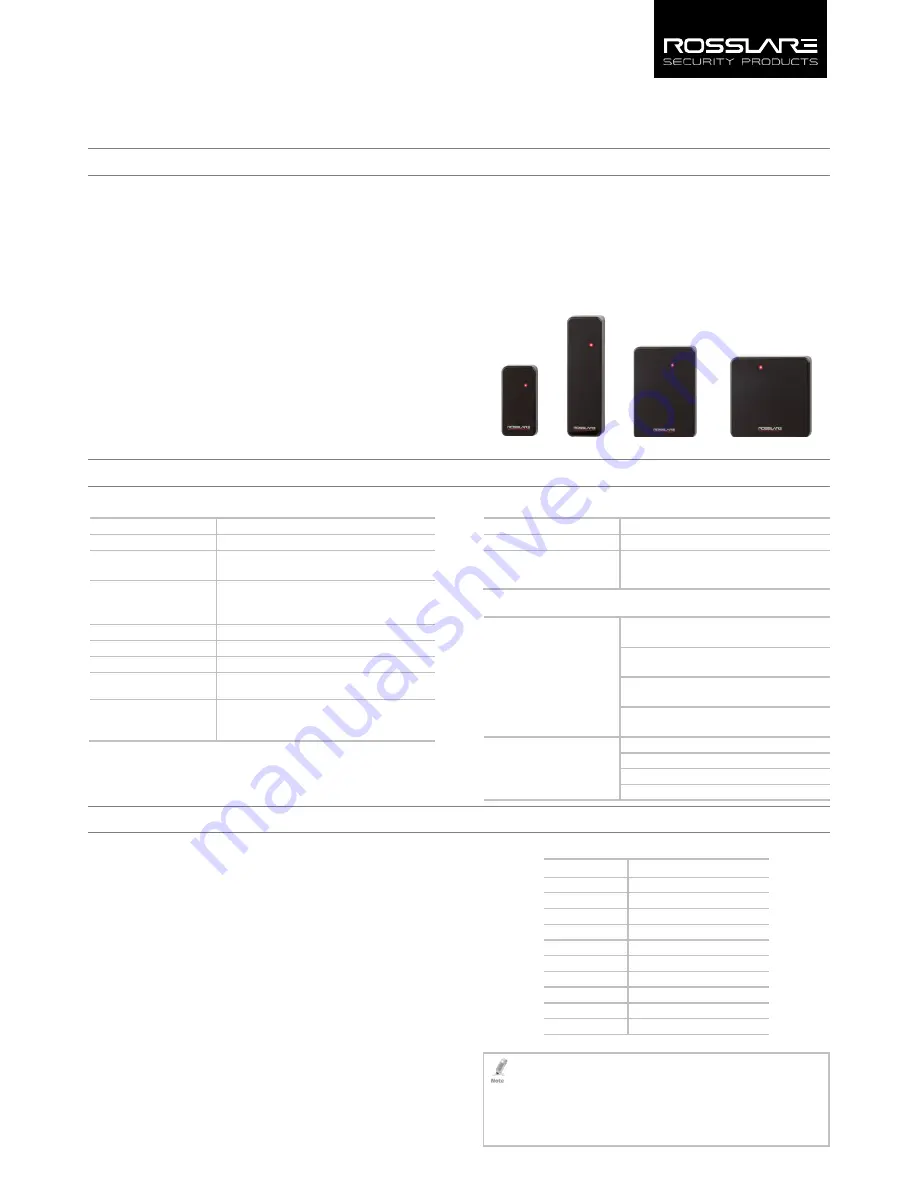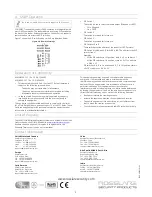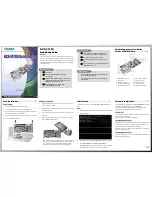
AY-x6255 Family
CSN SELECT Smart Card Readers
Installation and User Manual
1
1.
Introduction
The AY-x6255 is a family of multi-format contactless smart card
readers for use in access control system solutions.
CSN SELECT readers support reading from the secure memory of the
following credential technologies:
MIFARE Ultralight / Ultralight C
MIFARE Classic
MIFARE Plus S / Plus X
MIFARE DESFire EV1
ISO 14443A
ISO 14443B
ISO 15693
iClass
ISO 18092 (NFCIP-1)
FeliCa
1.1
Box Content
Before beginning, verify that all of the following is in the box. If
anything is missing, please report the discrepancy to your nearest
Rosslare office.
One AY-x6255 unit
Installation kit – Includes two wall plugs, two mounting screws,
security Torx screw, and security Torx screw tool
Installation and operating instructions
AY-K6255
AY-L6255
AY-H6255
AY-M6255
2.
Technical Specifications
2.1
Electrical Characteristics
Power Supply Type
Linear (recommended)
Operating Voltage Range
8 to 16 VDC
Current @ 12 V
Standby: 100 mA
Maximum: 120 mA
Read Range*
MIFARE Classic EV1: 40 to 45 mm (1.5 to 1.8 in.)
MIFARE Plus: 30 mm (1.2 in.)
MIFARE DESFire EV1: 30 mm (1.2 in.)
LED Control Input 1**
Green LED control, TTL
LED Control Input 2**
Red LED control, TTL
Auxiliary Input**
Buzzer control, TTL
Auxiliary Output**
Tamper output (open collector, active low, max.
sink current 30 mA)
Maximum Cable Distance
to Controller
Wiegand: 150 m (500 ft) with 18-AWG cable
OSDP (RS-485): 1200 m (4,000 ft) with 2x2 18-
AWG twisted shielded cable
* Measured using a Rosslare MIFARE card cards. Range also depends on
electrical environment and proximity to metal.
** Standard configuration. Custom configurations are available
.
2.2
Environmental Characteristics
Operating Temp. Range
-25°C to 65°C (-13°F to 149°F)
Operating Humidity Range
0 to 95% (non-condensing)
Outdoor Usage
Weather-resistant, UV-resistant, meets IP65,
epoxy-potted, suitable for indoor and outdoor
use
2.3
Physical Characteristics
Dimensions
(H x W x D)
AY-K6255: 80.5 x 40.5 x 14.7 mm
(3.2 x 1.6 x 0.6 in.)
AY-L6255: 144.9 x 42.9 x 22.1 mm
(5.7 x 1.7 x 0.9 in.)
AY-H6255: 110.7 x 75.0 x 17.1 mm
(4.4 x 3.0 x 0.7 in.)
AY-M6255: 89.5 x 88.9 x 16.8 mm
(3.5 x 3.5 x 0.7 in.)
Weight
AY-K6255: 77 g (2.7 oz)
AY-L6255: 126 g (4.4 oz)
AY-H6255: 163 g (5.7 oz)
AY-M6255: 145 g (5.1 oz.)
3.
Wiring Instructions
The units are supplied with a 10-conductor 18” (46-cm) pigtail or with
10 terminal blocks.
To connect a pigtail reader to the controller:
1.
Prepare the reader cable by cutting its jacket back 3.2 cm (1¼”)
and strip the insulation from the wires 1.3 cm (½").
2.
Prepare the controller cable by cutting its jacket back 3.2 cm (1¼")
and strip the insulation from the wires 1.3 cm (½").
3.
Splice the reader’s pigtail wires to the corresponding controller
wires (as indicated in Table 1) and cover each joint with insulating
tape.
4.
If the tamper output is being utilized, connect the purple wire to
the correct input on the controller.
The LED control may be configured by the factory to function
either as a LED control or as buzzer control. Currently, the auxiliary
input is used as buzzer control and LED Control 1 is used as the
green LED control.
5.
Trim and cover all unused conductors.
Table 1: AY-x6255 Wiring
Wire Color
Output
Red
Power
Black
Ground
Green
Data 0 / Data
White
Data 1 / Clock
Purple
Tamper Output
Orange
Green LED control
Brown
Red LED control
Yellow
Buzzer control / Auxiliary input
Blue
OSDP-RS-485-A*
Gray
OSDP-RS-485-B*
*H and M models only
•
The individual wires from the reader are color coded according the
Wiegand standard.
•
When using a separate power supply for the reader, this supply and
that of the controller must have a common ground.
•
The reader’s cable shield wire should be preferably attached to an earth
ground, or a signal ground connection at the panel, or power supply
end of the cable.




















